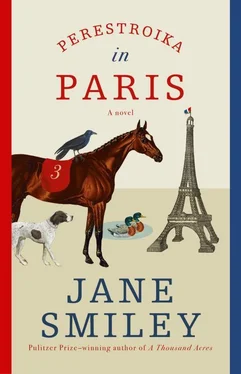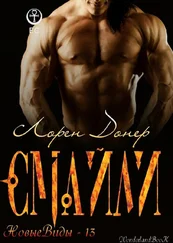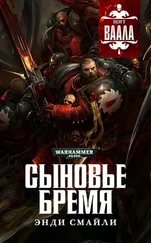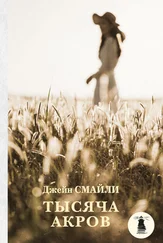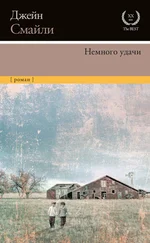Then a raven flew up and landed on Paras’s back. Anaïs was startled, but the horse only twitched, kept eating. The raven sidestepped forward along her spine, his eye on Anaïs—he kept turning his head, first one way and then the other. He was a little creepy—so utterly black in the dark. But every supernatural being had a companion, and at least he wasn’t a bat. Anaïs held tight to the bowl, and thought that if the raven tried to peck her eyes out, she could put the bowl over her head.
But the raven simply started to caw—caw-caw-cawcaw-caw—not loudly, but, or so it seemed to her, conversationally, somehow. And then the horse tossed her head, and the raven flew back to what Anaïs now saw was his perch on Monsieur Curzon’s potato bin. Anaïs set the bowl on the pavement; the raven sailed down to it and pecked up a few tiny bits. Anaïs laughed. Meanwhile, Paras quietly inspected the pockets of her benefactress’s apron. Anaïs cupped a lump of brown sugar—the one most preferred by customers—in the palm of her hand, and Paras took it, let it sit in her mouth, melting for a bit, then crunched it down. The raven looked up at Anaïs. Anaïs squatted down and offered him a lump of sugar. He took it in his beak, dropped it, pecked it, then picked it up and flew off with it. For a woman who had never had a pet because of her mother’s allergies, this experience of living in a world of horses, birds, and other animals was a pleasure to be cherished, even if they should turn out not to be embodied celestial beings.

A FEW DAYS LATER, when the weather was fresh and almost warm, Frida was lying in her spot with her bag nearby (a nice cloth bag that retained the fragrances of any vegetables or bones that had been carried in it). She waited, as a bird dog knew to do, and, sure enough, Madame de Mornay and Étienne shuffled out of the house, then opened the gate. Frida followed them. Etienne knew she was there, as he knew she stayed with Paras in the garden, but she was so shy that he hesitated to acknowledge her, and was waiting to see if she would acknowledge him. Madame used her cane with one hand and laid the other on Étienne’s shoulder. Étienne pulled the little two-wheeled shopping trolley along and kept his eyes forward. Frida assumed her place two paces behind them.
The surface of the shopping trolley, which was made of fabric, fluttered, catching Frida’s attention. The three of them crossed slowly at the traffic light. Autos did not honk, though Frida sensed their bursting impatience. Madame was steady, impervious. They passed the sporting-goods store, and Frida glanced through its glass door, but the fellow who had sold her the ball was not visible. The surface of the trolley fluttered again. Frida sped up, and she could smell the bad smell now, over and above the vegetable fragrance of her own bag. It was a grimy, sour odor. The odor of rat. Frida’s nose twitched.
But there were other things to attend to. There was that man running behind her, almost on top of her. Frida shifted her weight to the rear and the side. The man, who said, “Mon Dieu!,” was deflected off the curb, and Madame remained safe. The man slowed to a walk—much more appropriate, Frida thought.
Étienne and Madame stopped, unusually for them, in front of the chocolate shop. Étienne said something, then Madame said something, then they stepped inside, leaving the trolley on the threshold. The fabric of the trolley fluttered again. Frida stepped up to it, dropped her own bag, put her paw on it, nosed open the flap. Yes. He was inside the trolley—a small, dark, glossy rat. He had been scratching around, but now he went quiet and stared up at her, his eyes large and frightened. Frida bared her teeth.
Kurt said, “I’m sorry. We haven’t met, but I’ve seen you through the window. You are friends with Perestroika.” He added, “My friend.”
Frida understood that she had overreacted. She cleared her throat and said, “Yes, I’ve heard about you. I understand you are not game.” Even so, her whiskers twitched.
Kurt said, “Where are we?”
“Rue de Grenelle, outside the chocolate shop.”
“What is a chocolate shop?”
Frida, who saw Étienne and Madame approaching with a box, said, “Curl up in the corner and find out. But keep your paws to yourself.” She stepped back. Étienne, still attending to Madame, put the little box into the trolley without looking. He closed the flap, and they walked on. Madame was saying, “Nothing wrong with an occasional treat. I bought a box of candied orange peel dipped in dark chocolate. Some other nice things in the box, too. Take good care of it, my darling.”
Étienne patted his great-grandmama on the back of her hand.
They walked on.
Frida took a few deep breaths, and at the fruit-and-vegetable market, where Jérôme was absent for some reason, replaced by a young woman, she waited until Étienne and Madame began inspecting vegetables (always a long process), then nosed open the flap. The little box was untouched. She said, “Why did you come along?”
“I didn’t mean to. I was sleeping in here, and suddenly we were out the door. I always wanted to get out the door, but now I’m not so sure. Do you see any rats around—females, perhaps?”
“Not a one,” said Frida.
“Oh dear.” Kurt sighed.
“It’s too busy for rats. There are humans and automobiles everywhere. I can’t say that I smell a rat in the neighborhood right now, but I’ve gotten a whiff from time to time.”
“My father tells me that cats did away with everyone. We are the last living rats.”
“He’s exaggerating,” said Frida.
Kurt curled into a ball, his paws over his face. Frida let the flap drop and sat down in her attentive and statuesque position beside the trolley. She was a predator, but even so, she did not want the rat to be squashed by groceries. It was a conundrum—if Étienne merely dropped the bag of vegetables into the trolley, that might endanger the rat (but also the chocolates); if he reached in to take out the box of chocolates, he would see the rat, and then there might be chaos. There was a reason why Paris was home to so many fat cats—the rat’s father was wrong about numbers, but not about culture. Étienne and Madame went deeper into the shop. Frida bumped the trolley, knocking it over so that it fell on the fabric side, then put her nose down as if sniffing it, and said, “Ease yourself out under the flap. I’ll lie down close to the wall of the building, and you can hide between me and the building.” She arranged herself. Kurt slipped out. He looked rather striking to Frida, but the Parisians had their chins in the air, and if they saw him, they did not react. He pushed in behind her. He whispered, “The boy petted me once,” but after that said nothing. She barked one gentle bark, and Étienne appeared a few seconds later. He stood the trolley back up, said, “Bon chien!,” and pulled the trolley into the shop. Frida had no idea what to do next. She lay quietly, ears forward. Humans saw her and smiled, but did not, apparently, look closely—there were no screams or gasps. The feel of the rat’s fur against her leg was warm and soft. The stink was not overpowering, not unlike the stink of every mammal, including Madame de Mornay. Every so often, the rat gave out a little squeak, but it was so soft and high-pitched that humans could not have heard it.
Étienne and Madame came out of the vegetable shop, went into the meat market. Frida remained still, arranging herself to look as proud and supercilious as she had ever done before, even in her days of solitude in the Place du Trocadéro. As a result, the woman in the meat market didn’t chase her away.
Читать дальше
